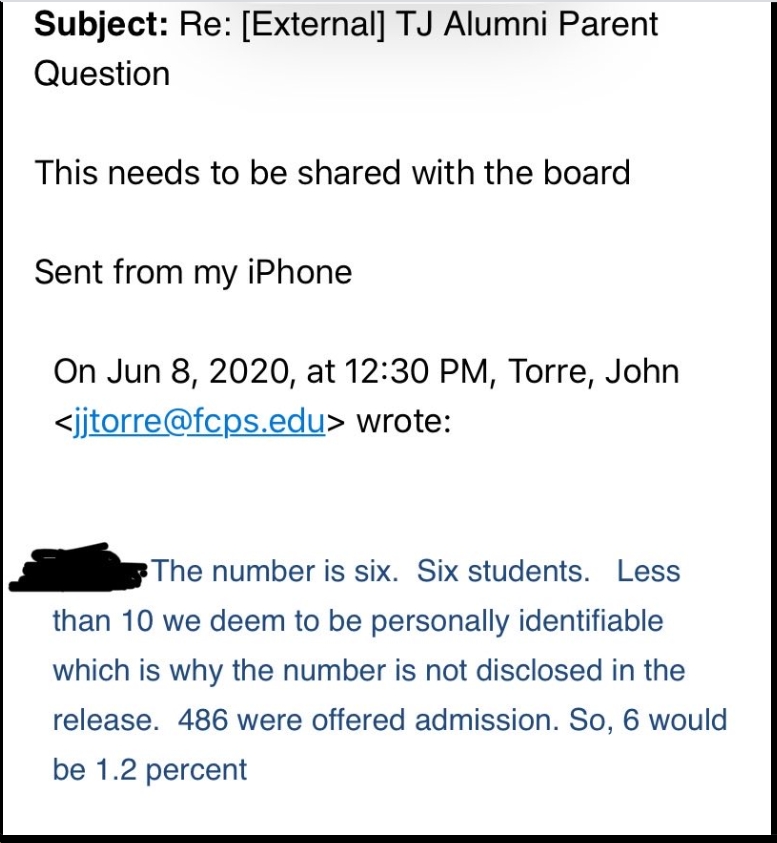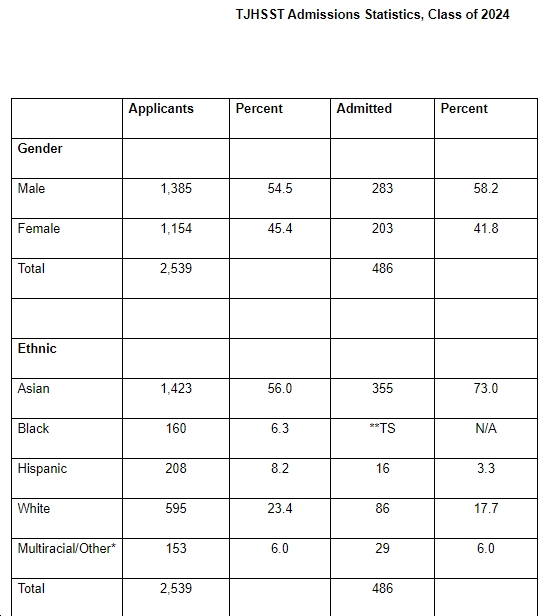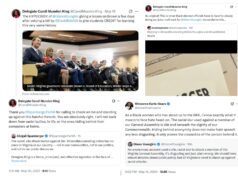UPDATED 6/12: The Fairfax County Public Schools’ Communications Director is saying that the number of African-American students admitted is actually six, not zero. Still pathetically low, out of 486 offered admission, and given that the African-American students make up about 10% of the Fairfax County public school system.

As people across America march and protest against racial inequity and injustice – or, to put it more positively, march and protest FOR racial equity and justice! – it’s important to realize that these issues go far beyond criminal justice and policing, as important and crucial as those things are. In fact, our country has pervasive and entrenched racial inequities and injustices in a wide variety of areas, including the topic of this post – education.
For instance, here in Virginia – in news that probably was “buried” to a large extent by all the other craziness going on right now – this past Monday, Fairfax County Public Schools posted admission information for the the Class of 2024 at Thomas Jefferson High School for Science and Technology (aka, “TJ”). A few highlights include:
- Not surprisingly, for a school which is ranked the top U.S. public high school in the country, it’s VERY competitive, with only 19.1% of applicants being admitted. Also note that this school is “the first high school to launch a satellite into space,” is “one of the only high schools in the country to build its own mini-server farm,” and “continues to produce incredible alumni…7 Rhodes Scholars and the Founder/CEO of an $8 Billion startup democratizing financial markets to the sitting Governor of New Hampshire and a world-class athlete.” So again, it’s no surprise that many Northern Virginia parents really, really want to see their kids go there.
- “Approximately seventy-two (71.6) percent of the students offered admission reside in Fairfax County and twenty-eight (28.4) percent are from Arlington, Loudoun, and Prince William Counties and the City of Falls Church.”
- Of students admitted to the class of 2024, 58.2% are male and 41.8% female.
- 73% of students admitted to the Class of 2024 are Asian-American, with 17.7% White, 3.3% Hispanic, and…believe it or not, there are ZERO African Americans (out of 160 who applied). That’s right, at a time when the entire country is focused on racial inequity and injustice, the 486-strong “TJ” Class of 2024 will contain just 16 Hispanics and no Black students at all. What on earth? See below for some discussion about possible ways to address this, barriers to addressing this, etc.

- Let’s start with the bill that Sen. Scott Surovell (D) – who represents a highly diverse district and who has been vocal about TJ’s lack of diversity for many years – introduced in the 2018 Virginia General Assembly session, only to see it killed (“Passed by Indefinitely”) in the Senate Education and Health Committee, on a 13-1 vote.
- See below for video, in which Surovell argues for his bill, which would require TJ “to accept for enrollment (i) a sufficient number of students eligible to receive free or reduced price meals such that the total of such students is at least 50 percent of the weighted average of the participating divisions’ percentage of such students in the previous school year and (ii) at least five students but no more than 15 students from each middle school in each school division eligible to matriculate…”
- In response, Sen. Dick Saslaw (D) – then Senate Minority Leader, now Senate Majority Leader – argues that TJ is NOT a “school for rich kids,” but in fact the Asian-American parents (many of whom said their kids there) are “not wealthy people,” but have “a substantial amount [sic] of programs set up for these children…to get them ready to take that test.” Saslaw adds that “this school has been based strictly, STRICTLY on merit only, and has never changed…they’ve had 8 Rhodes Scholars, they have research labs that some of the colleges in this state would be the envy of it...it’s been strictly merit based…I see absolutely no reason to change that, it is not based on wealth, it is based on preparation.” Saslaw concludes, “I just can’t see taking a school that…[has been] called…the top high school in America and changing it, because you can’t get kids in from Route 1.” Yikes. I mean, where to even begin? For starters, the entire concept of “meritocracy” is highly dubious, but…that is a long discussion, probably best left for another day. But obviously, there are *many* determinants – socioeconomic status, etc. – aside from just “merit,” however that’s defined exactly. Also note that wealthier schools have the means to supplement curriculum with enrichment programs that poorer schools can only dream of.
- Sen. Mamie Locke (D) asks about the breakdown of student admissions, to which Sen. Surovell responds that Rachel Carson Middle school and other middle schools “in the wealthier parts of Fairfax County” (e.g., Great Falls, Falls Church), while “the eastern part of Fairfax County, which I represent – everything east of I-95 – didn’t have one national merit semi-finalist last year out of 6 or 7 highs schools. I don’t think the kids in my part of the county are any dumber than the kids in the rest of the county, but apparently they just can’t get into TJ.” Sen. Surovell also notes that the NAACP filed a complaint “because African-American and Hispanic/Latino children can’t get in; Latino kids make up 24%-25% of Fairfax County’s overall student population, Black children make 10%…TJ is 2% Hispanic and 1.5% Black, and the NAACP is tired of those results and thinks they’re discriminatory.”
- With regard to Sen. Surovell’s comments, see his post on this topic, regarding the TJ Class of 2020, which Sen. Surovell writes: “looks nothing like Fairfax County…has a Black student population of 1.5% and Hispanics represent 2.2% of the school’s population compared to 10% Black and 24% Hispanic in FCPS as a whole.”
- Sen. John Cosgrove (R) also chimes in, opining that TJ is “absolutely an amazing facility that takes the best and the brightest of students” who “work so hard to get there”; that it’s “one of the finest high schools in the entire country”; that “it’s a terrible idea to mess with something that’s working SO well”; that “we just need to leave it alone.” Of course, that really doesn’t address anything Sen. Surovell’s talking about.
- Sen. Janet Howell (D) says “I agree with Sen. Cosgrove”; argues that TJ admissions are “based on merit”; that we don’t have “any business meddling with the decisions of the Fairfax County School Board”; and that “quotas are really a politically charged topic and I don’t think we should be going there.” There’s certainly an argument for local school boards dealing with this kind of thing, except that: 1) in this case, Sen. Surovell argues that they haven’t dealt with it; and 2) these are “Governor’s Schools,” set up by the Virginia General Assembly, so they’re in a somewhat different category than regular public schools.
- Sen. Mark Peake (R) basically argues that the state shouldn’t tell local school boards how to manage their schools.
- Sen. Chap Petersen (D) argues that “the best and the brightest kids get steered into the top middle schools through these AAP programs.” Petersen adds, “I’ll avoid sort of all the racial politics, but there’s also a lot of intermarriage in Fairfax County, and if you’re going to start classifying people by race and limiting if they can get or not get into schools, you’re going to go down a whole different path.” Huh? As usual, it’s hard to tell what Sen. Petersen’s talking about, but it doesn’t sound good at all.
- Retired, long-time (30 years, including the last 7 years at Rachel Carson Middle School) Fairfax County teacher Patricia Hyning testifies that “Carson is a great school, but just because the kids achieve well…doesn’t mean it’s a better school than another school; it’s partly what you’re given.” Great point! Hyning adds: “What you need to know about Carson is there is a pipeline…what’s happening is the parents have figured out the formula; certain communities make sure that their kids starting early on get into every competition you can get in…I’ve watched 200 kids stand in the hall lined up to audition for Science Olympiad, but only 30 kids could get in; their parents have paid for extra classes…Johns Hopkins programs in the summer for gifted students. The cram course for the entrance exam for TJ starts in third grade…little eight year olds sitting in a classroom learning how to prep for the TJ exam. So these kids are set up for this kind of thing. So a regular kid who’s an excellent student, loves math and science, but mom and dad don’t know to put them in all these things, or can’t afford it – I found one prep session online last night, two months of prep $1,000; you take it right before the exam in the fall. Not everybody has that money, not everybody has the savvy…I understand that the Embassy of Korea has a link to TJ admissions. I taught many kids who came here from India specifically to attend Carson and TJ specifically. The parents…put the kids in the Carson pipeline to TJ…There are parents who are buying their kids a seat at TJ…not all children have this same opportunity, but they have the aptitude.”
- A representative from Fairfax County Public Schools argues that the new superintendent “agrees with [a focus on equity and access] being a priority,” has created a new position, “Chief Academic and Equity Officer,” but that “the reality is TJ is a very highly competitive school,” that they “welcome this discussion” but that it shouldn’t be held in the Virginia General Assembly. I’m not sure what that means, but basically sounds like they don’t want to deal with it.
- Sen. Surovell concludes: “This school gets investment from the private sector that other schools in the county can only dream of. The other schools in the county just can’t compete – all the corporations want to put all their money in so they can have all these fancy wind tunnels and laser labs and stuff that other children in the county have no access to and could never get, because these can’t attract that kind of private sector capital and attention to their schools. And so it’s a wonderful facility, but it’s not fair because not everybody gets to use it. With regard to meddling in the local school board, I totally appreciate that. The problem is, this has been an issue for 10 years, and the local school system hasn’t dealt with it and the school board won’t deal with it...we’re the ones that created governor schools and we need to step in.”
- The bill was then “PBI’ed” (aka, killed) by a 13-1 vote.
- From the committee discussion, you can see why this issue never seems to get anywhere. Basically, a lot of people, both Republicans and Democrats, think that TJ is a great school – which it most certainly is, and which is why so many parents want their kids to go there! – and that everything’s working great – which is definitely debatable. But there are also some serious questions about *how* exactly to address the issues raised by Sen. Surovell and others, such as the 30-year retired Fairfax County teacher.
- There’s an interesting article on this topic that was just posted yesterday by recent TJ graduate – Neil Kothari. Basically, Kothari argues that TJ is a great school, but that “something is very wrong,” specifically that “[w]hile the diversity and inclusion of Asian cultures are certainly present, we are leaving behind key segments of the population whose presence would make us better as students, citizens, and humans.” Kothari specifically notes that “0 Black students were admitted to the Class of 2024,” and that more broadly, “Black and Latinx students [are] being admitted to TJ at a lower rate when compared to the demographics of the counties it pulls from.”
- So what to do about this situation? Kothari raises a number of possibilities – “use race or income as a factor for admission”; “reserve a certain number of slots for students from underrepresented middle schools”; have “some or all of the seats are reserved to be entered into a lottery system”; “modifying the admissions process itself”; or even “abolish or defund TJ.”
- In the end, Kothari rejects all of these options, in large part because he believes that “parents who are hungry for admission to TJ will find a way to circumvent them, and undermine their original purpose.” Instead, Kothari argues, “the issue of inequity is much larger than TJ, and must be addressed before a student applies,” by “reaching students in their elementary and middle schools, while introducing the idea of TJ and working tirelessly to help them achieve and prepare at the same level as children of ‘tiger parents.'”
- Finally, note that Kothari’s approach differs significantly from Sen. Surovell’s, but – unlike Sen. Saslaw, etc., who seem to think that everything’s great and doesn’t need fixing – Kothari definitively and strongly asserts that “something is very wrong” and needs to be addressed. I agree with Kothari on that, and believe he makes excellent points about how proposed solutions could fail. But, I’d argue, we can’t “let the perfect be the enemy of the good.” In this case, we need to start trying things to reform a system which, clearly, isn’t leading to a student body that’s reflective of Fairfax County’s population, and in the case of the TJ Class of 2024, somehow ended up with literally ZERO African-American students admitted. I honestly don’t understand how anyone can argue that this is acceptable in any way, in a publicly funded high school no less. Your thoughts?



 Sign up for the Blue Virginia weekly newsletter
Sign up for the Blue Virginia weekly newsletter







